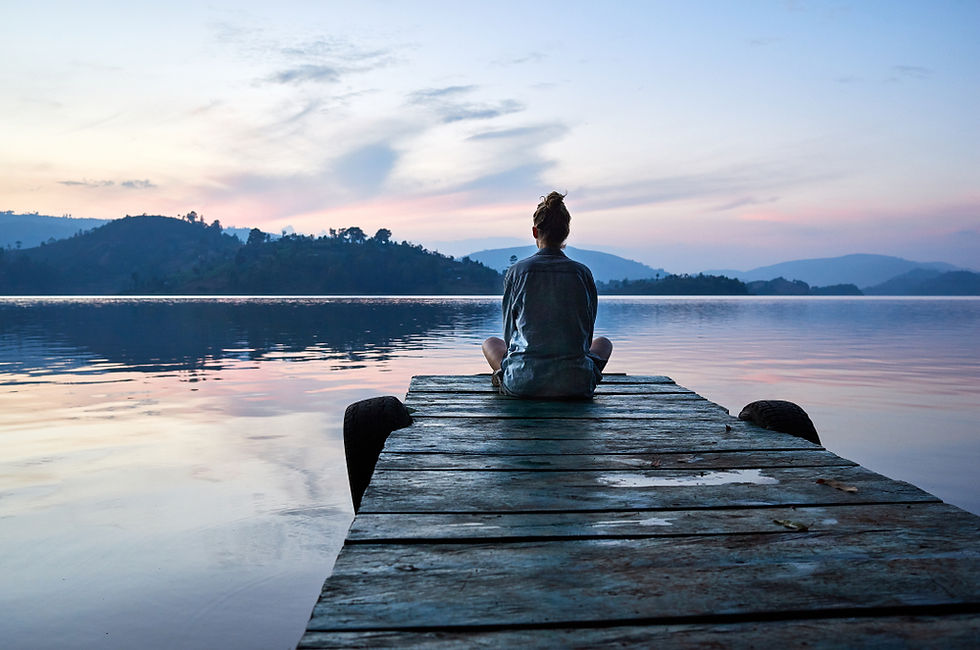Embrace your Anxious Feelings
- Sharon Cole

- May 19, 2021
- 4 min read

"If you're not comfortable hugging people this week, that's ok. If you're not comfortable going out and about, that's ok. If you're not comfortable in a house and would rather live in the forest and try to communicate with squirrels and hedgehogs, that's ok. Just take your time."
- Dave
An amusing meme I found on Facebook this week, but the truth is there. You decide what's right for you at this moment in time.
It's tempting to avoid the messiness of daily living, but in the process, are you guilty of ignoring your anxious thoughts?
What do you do when anxiety begins to rear its ugly head? Are you keen on distracting yourself by always being super busy? Do you tell yourself to stop being silly and just get on with it? Or do you smile and put on a happy face for the outside world?
Whatever your chosen coping mechanism might be, it's probably not stopping to listen to your feelings, but ignoring your feelings might be doing you more harm than good. Acknowledging anxiety is the first step to cultivating a peaceful and happy space within yourself.
Feel the feeling
According to research from the University of California, those of us who frequently resist acknowledging our darkest emotions or judge them harshly can feel more stressed. And what's worse is a report in the Journal of Psychosomatic Research which warns that suppressing our emotions could even decrease our life expectancy.
So why do we all avoid our more uncomfortable emotions? Dr Elena Touroni, a consultant psychologist, thinks it's all to do with our biological make-up. She explains that anxiety is a normal and healthy emotion rooted in human evolution, which works to trigger our fight or flight response and keep us safe. Anxiety can cause unpleasant reactions such as difficulty breathing and increased heart rate. So it's only natural that we want to avoid it.
The problem is that today's environment is very different from that of our ancestors. Over thousands of years, most of our experience was related to us having some "evolutionary advantage." This means that having these traits (even higher anxiety) helped us survive and/or reproduce successfully, i.e., it enabled us to run away from dangerous situations.
As we no longer have the option to run away, the next best thing is to try and suppress it. "Unfortunately, avoidant behaviours usually only end up reinforcing our stress," Dr Elana says, "The more we avoid these situations, the more we tell our brain we only 'survived' the threat by steering clear of it".
Changing your view
So do we need to retrain our brain and catch up with the ever-changing idea of what a safe environment looks like for us? I believe that embracing our feelings is part of being a human being, and there are no good or bad feelings, just feedback. Unfortunately, we have been conditioned to believe that our emotions are either 'good' or 'bad'. We must be 'good', 'nice', and 'positive' to fit into this world and be accepted by society (something we all desire).
But this denies us the natural human experience. These emotions help us to learn more about who we are and who we want to be. Fear, grief, anger, shame, guilt and doubt are all part of being human, and every single one of us experiences them, whether we are conscious of it or not.
Sit with your thoughts
Acknowledging our emotions for what they are is essential. We often describe ourselves by our emotional state, for example, 'I am bored, angry, stressed or worried'. But by observing our emotions, it becomes easier to understand them. Naming them can help too, so you could say, 'This is worry, this is what it feels like', and then sit with that for a while. No judging or analysing, just accepting the feeling, which is often enough to lessen the sensations that accompany the feeling of worrying too much.
Try it for yourself
The solution then is to become more in tune with our thoughts. Here are my favourite ways to do just that.
Meditation - A regular meditation or mindfulness practice can help you become more aware of any unhelpful thought patterns, and daily affirmations can help us change our mindsets.
Journaling - Sitting down with a blank page and writing down those thoughts can help you get in touch with where you are, what you feel, and ultimately, what you need.
Bodywork - Aim to move your body for 20 minutes every day. This is about being connected in mind and body, conscious of the sensations and feelings your anxious thoughts are creating and not avoiding them. Also, movement can help us to burn off those excess stress hormones.
Reiki - Reiki is a meditative practice that promotes relaxation, reduces stress and anxiety, and promotes a positive mental state through gentle touch. This can help us to heal the subconscious root of your emotions energetically.
It takes courage to let go of the familiar and embrace the new.
Related posts:




Comments